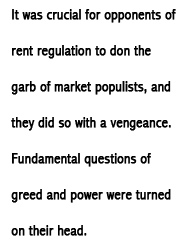May 11, 2011 — As reported in Gotham Gazette, New York Governor Andrew Cuomo says that he supports the “strongest possible” strengthening of the state’s rent regulation laws, but, with those laws scheduled to expire in little more than one month, he has “refused to name what specific measures he does or does not support.”
His refusal to clarify his intentions continues weeks after he made a budget deal with State Senate Republicans that did not secure the strengthening of the rent laws as part of the bargain. According to Michael McKee, treasurer of Tenants PAC, a leading organization that supports stronger rent regulations, resolving the budget without resolving issues like rent regulation meant “[Cuomo] has given away the best leverage we had.”
It is not a new phenomenon that Republicans have seemed willing to expend more energy and political capital fighting rent regulation than Democrats have dedicated to preserving or expanding such regulation.
The key turning point in the decades-long battle over rent regulation came in 1997, when then- New York Governor George Pataki managed to achieve major headway for the anti-regulation forces. “Let Them Rent Cake: George Pataki, Market Ideology, and the Attempt to Dismantle Rent Regulation in New York,” first published in 2004, examined both the 1997 battle and subesquent 2003 struggle, and provides a context for understanding just how central market theology was to reducing the housing security enjoyed by millions of New Yorkers.
From the introduction to “Let Them Rent Cake” (citations omitted):
There are not many issues upon which the editorial boards of all the daily newspapers in New York City agree. Yet in the spring of 1997, The New York Times, the Daily News, the New York Post, and Newsday were unanimous in respect to one thing: rent regulation had to go. The editorialists (joined, less surprisingly, by their colleagues at the Wall Street Journal and Crain’s New York Business) were hardly reflecting popular sentiment. A poll of New York City residents in June 1997 found that “[a]t least 70 percent of [New Yorkers] — including homeowners and tenants — said rent regulations were necessary to provide affordable housing and to prevent rents from soaring.”
What the editorialists were reflecting was the pervasiveness of the idea of the “free market” as natural and beneficial, and of the corollary notion that restrictions on that free market are unnatural, unjust, and counterproductive. This theology provided the basic assumption that underlay and constricted much of the policy debate over whether to extend, modify, or eliminate the rent regulation system, a system which was due for its periodic renewal on June 15, 1997.
Opponents of rent regulation, of course, had a serious problem with which to deal. Rent regulation protected about 2.5 million people in New York City. It was thus crucial for adherents of markettheology to don the garb of market populists, and they did so with a vengeance. Fundamental questions of greed and power were turned on their head. Forget that the principal motive for building owners and their allies might indeed be the maximization of profit. Forget that the security of tenure that tenants enjoyed under rent regulation (i.e., the right to lease renewals) would evaporate if rent regulation were to end and that, thereafter, tenants could remain in their homes only so long as the arrangement suited the landlord. Focus instead on a very different picture painted by opponents of rent regulation: the quintessential landlord was thestruggling owner of a small building being deprived of the ability to earn a livelihood. The quintessential tenant was the wealthy family shamefully exploiting the system at the expense of their poorer brethren. If only regulation were ended, rents might actually go down, and a new era of apartment construction would begin.
At the center of the controversy was New York’s governor, George Pataki, a man firmly committed to market theology, and a man whose reelection campaign was only a year away. The Governor, the unquestioned leader of his party, had an ambitious agenda: set rent regulation on the road to its demise while presenting himself as a friend of tenants. Through a strategy of concealment, soft-pedaling, and implicit coordination with like-minded, pro-landlord forces, he came close to staging a spectacular short-term victory. Instead, he ultimately had to settle for making what was still real and substantial progress toward a day when no apartments would be regulated, and market values would trump all other values.
